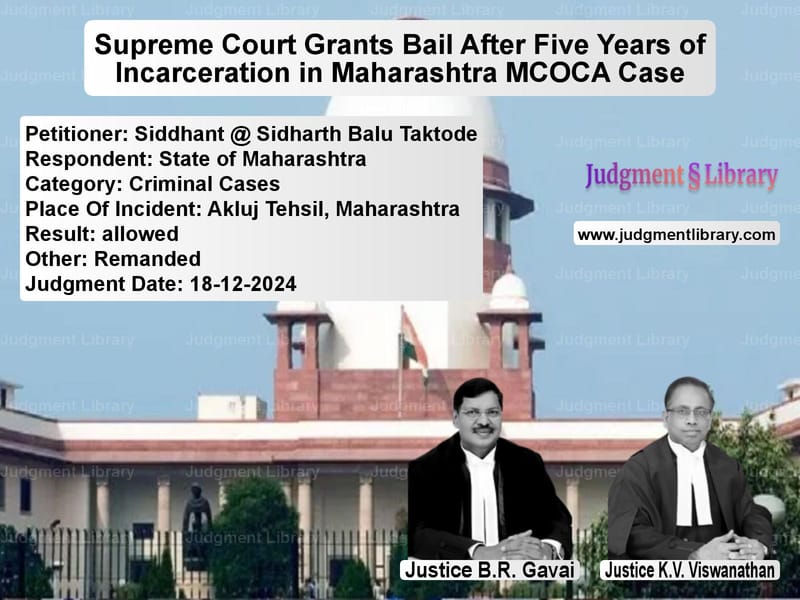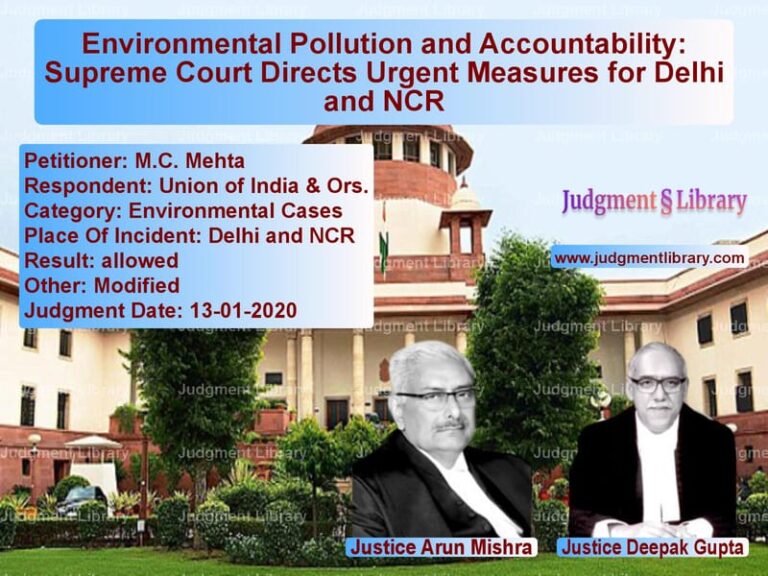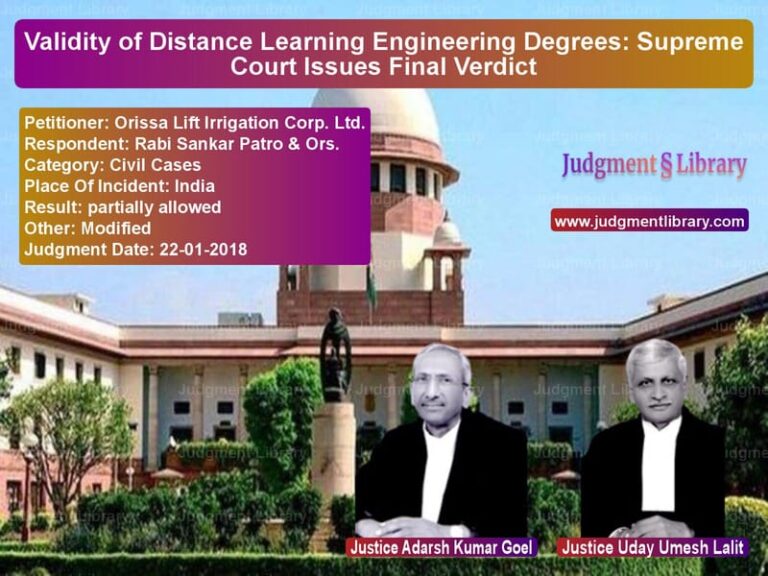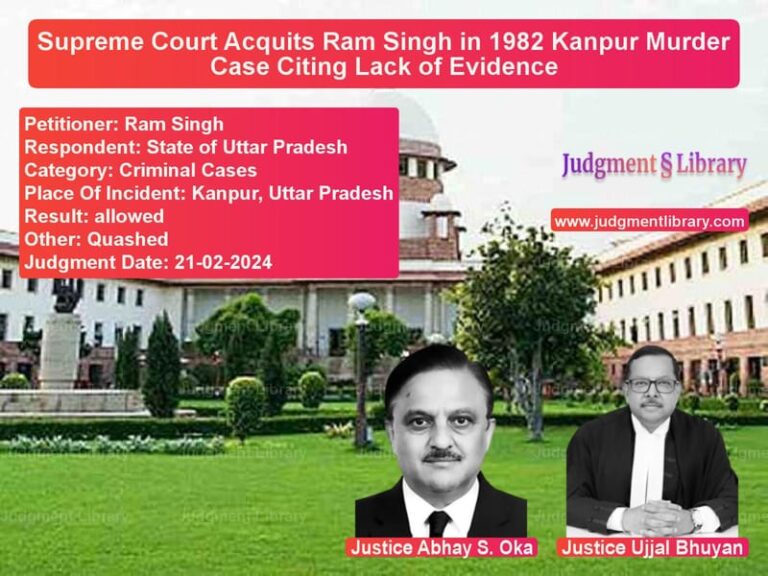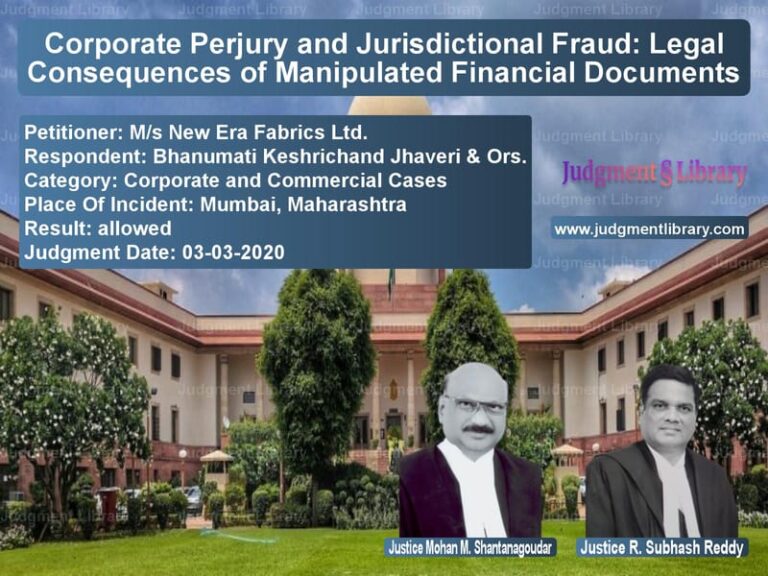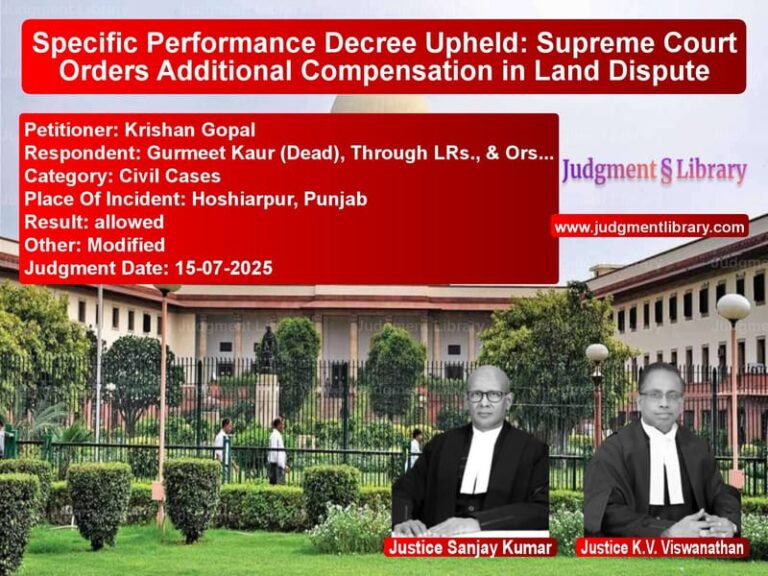Supreme Court Grants Bail After Five Years of Incarceration in Maharashtra MCOCA Case
The Supreme Court of India, in Siddhant @ Sidharth Balu Taktode vs. State of Maharashtra, granted bail to the appellant after he had spent nearly five years in custody under charges filed under the Maharashtra Control of Organised Crime Act, 1999 (MCOCA). The judgment, delivered by B.R. Gavai and K.V. Viswanathan, criticized the prolonged incarceration without trial, stating that such delays amount to imposing a sentence without due process.
Background of the Case
The appellant, Siddhant @ Sidharth Balu Taktode, was arrested on allegations of being part of an organized crime syndicate operating in the Akluj Tehsil area of Maharashtra. The prosecution contended that he was involved in a series of violent crimes and extortion activities that created a sense of fear in the local community.
The Special Court, designated under MCOCA, denied bail on February 2, 2024. The Bombay High Court upheld this order on July 29, 2024, citing that the appellant failed to satisfy the twin conditions of MCOCA for bail:
- That there were reasonable grounds to believe he was not guilty.
- That he was not likely to commit further offenses while on bail.
The appellant approached the Supreme Court, challenging the High Court’s order, primarily on the ground of delayed trial and violation of fundamental rights.
Legal Issues Considered
- Does prolonged incarceration without trial violate the fundamental right to a speedy trial?
- Can an accused under MCOCA be granted bail despite stringent conditions?
- Did the prosecution fail to justify the continued detention of the appellant?
Arguments by the Appellant
The appellant, represented by Advocate Anand Dilip Landge, argued:
- That he had already spent five years in custody without trial, violating his right under Article 21 of the Constitution.
- That he had a single past criminal antecedent, which did not justify the invocation of MCOCA.
- That on the date of the alleged crime, he was 26 kilometers away from the scene, and photographs proved his absence.
- That the authorities failed to produce him physically or virtually in court for 102 hearing dates, further delaying the trial.
Arguments by the Respondents (State of Maharashtra)
The State of Maharashtra, represented by Advocate Varad Kilor, countered:
- The appellant was part of a criminal syndicate that had created a climate of fear in Akluj Tehsil.
- Granting him bail would allow him to resume criminal activities.
- The High Court correctly relied on State of Maharashtra v. Vishwanath Maranna Shetty, where bail was denied to an organized crime syndicate member.
Supreme Court’s Observations
On the Right to a Speedy Trial
The Court strongly criticized the delay:
“If an accused is incarcerated for a period of approximately five years without even framing of charges, leave aside the right of speedy trial being affected, it would amount to imposing a sentence without trial.”
On the Prosecution’s Failure to Produce the Accused
The Court expressed serious concerns:
“For a period of the last six years, out of 102 dates, the accused has not been produced before the Court either physically or through virtual mode on most of the dates.”
On the Applicability of MCOCA Bail Conditions
The Court relied on its recent ruling in Manish Sisodia v. Directorate of Enforcement (2024), which held:
“Prolonged incarceration without trial would result in forcing the accused to face the sentence without undergoing the trial.”
Final Verdict
The Supreme Court set aside the orders of the Special Court and the Bombay High Court and issued the following directives:
- The appellant shall be released on bail upon furnishing a bond of Rs. 50,000 with one or more sureties.
- He shall not enter Akluj Tehsil until the trial is completed.
- He must reside at a disclosed location and inform the police about his movements.
- He shall attend every hearing and not seek unnecessary adjournments.
- Non-compliance with bail conditions will result in immediate cancellation of bail.
Supreme Court’s Directions for Systemic Reform
Recognizing that this issue is not isolated, the Court issued additional directives:
- The Registrar General of the Bombay High Court, the Home Secretary of Maharashtra, and the Law Secretary of Maharashtra were directed to establish a mechanism ensuring timely production of undertrial prisoners.
- The state must ensure that undertrials are produced either physically or virtually for every hearing.
- The order must be circulated to all trial courts handling MCOCA cases.
Impact of the Judgment
This ruling has far-reaching implications:
- Sets a strong precedent for bail in cases of prolonged detention under stringent laws.
- Recognizes the right to a speedy trial as a fundamental safeguard against misuse of preventive detention.
- Directs systemic reform to prevent delays in undertrial prisoner production.
- Strikes a balance between individual liberty and state security concerns.
The judgment reinforces the principle that justice delayed is justice denied and calls for urgent reforms to prevent indefinite incarceration without trial.
Petitioner Name: Siddhant @ Sidharth Balu Taktode.Respondent Name: State of Maharashtra.Judgment By: Justice B.R. Gavai, Justice K.V. Viswanathan.Place Of Incident: Akluj Tehsil, Maharashtra.Judgment Date: 18-12-2024.
Don’t miss out on the full details! Download the complete judgment in PDF format below and gain valuable insights instantly!
Download Judgment: siddhant-@-sidharth-vs-state-of-maharashtra-supreme-court-of-india-judgment-dated-18-12-2024.pdf
Directly Download Judgment: Directly download this Judgment
See all petitions in Bail and Anticipatory Bail
See all petitions in Custodial Deaths and Police Misconduct
See all petitions in Terrorist Activities
See all petitions in SC/ST Act Case
See all petitions in Judgment by B R Gavai
See all petitions in Judgment by K.V. Viswanathan
See all petitions in allowed
See all petitions in Remanded
See all petitions in supreme court of India judgments December 2024
See all petitions in 2024 judgments
See all posts in Criminal Cases Category
See all allowed petitions in Criminal Cases Category
See all Dismissed petitions in Criminal Cases Category
See all partially allowed petitions in Criminal Cases Category

